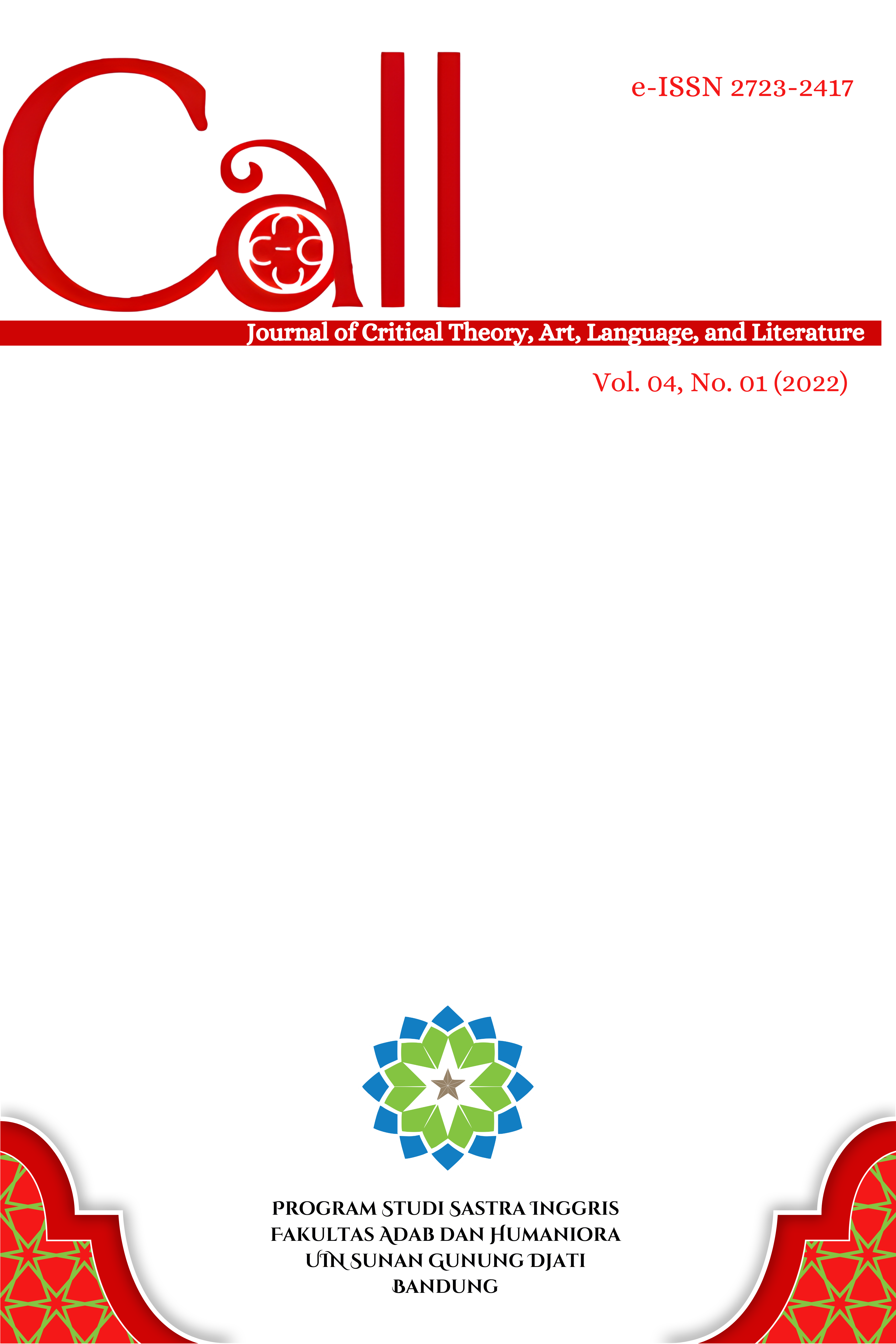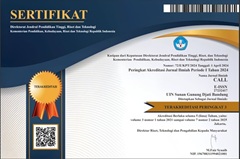REALISM AND COLONIALISM IN DANIEL DEFOE’S ROBINSON CRUSOE
DOI:
https://doi.org/10.15575/call.v4i1.15471Abstract
This study deals with realism in Defoe’s Robinson Crusoe. Realism in the study explained the straightforward treatment in life. Realism sheds light on the immediate, the specific actions and their verifiable consequences. Realism seeks a direct connection between representation and the subject. The study is aimed to interpret the actualities of any aspect of life, not restricted to subjective prejudice, idealism, or romantic color. First, an introduction is presented about Realism, which is comprehensively linked to the history of realism and its revolution. Then, the reasons that affected development of English novel will be explained in details. Moreover, we give an extensive emphasis on realism in English literature and describe the novel in 18th century. Then, characteristics of English novel is explained in details and definitions of realism according to a number of authors expressed then we talk about Daniel Defoe as the father of early English novel. Finally, Robinson Crusoe is analyzed and the most important themes of the novel such as colonialism and realism are shed light on to show the degree of similitude in the novel that drew the attention of its readers since the 18th century.
Keywords: eighteenth century novel, early english novel, Daniel Defoe, Realism, Robinson Crusoe
References
Bignami, Marialuisa ed., (1997). Wrestling with Defoe: Approaches from a Workshop on Defoe’s Prose (Milan: Cisalpino), 40.
Defoe, Daniel. (1791) Robison Crusoe, or The Life and Strange and Surprising Adventures of Robinson Crusoe. William Taylor: London.
Flint, C. (1988). Orphaning the family: The role of kinship in Robinson Crusoe. ELH, 55(2), 381-419.
Joseph Addison, Sir Richard Steele, and Eustace Budgell, Sir Roger de Coverly, ed. (1967).
N. A. “Realism.â€Merriam-Webster, Merriam-Webster, Error! Hyperlink reference not valid. [Accessed on March 4th, 2021] “Realism and the Realist Novel.†Virginia, http://www2.iath.virginia.edu/elab/hfl0254.html [Accessed on August 22nd, 2021]
Hasan, Mariwan N.. (2015) “The Eighteenth Century and the Rise of the English Novelâ€. International Journal of Literature and Arts. Vol. 3, No. 2, 18-21. DOI: 10.11648/j.ijla.20150302.12.
Hasan, Mariwan. (2022). Modern and Contemporary Novel: Allegory, Satire, Colonialism, Power and Identity: A Collection of Critical Essays. Lap.
Hasan, M., Mustafa, S., & Abdulrazzaq, Z. (2022). Abuse Practice of Power in Orwell’s Animal Farm. Studies in Literature and Language, 24(1), 65-72.
Hasan, M., Karim, G., Hassan, N., & Ahmed, R. (2020). Colonialism in Chinua Achebe’s Things Fall Apart. International Journal of Educational Theory and Practice, 23-30.
Hasan, M., & Sharif, D. (2020). William Golding’s Lord of the Flies: A Reconsideration. NOBEL: Journal of Literature and Language Teaching, 11(2), 125-136.
Hasan, M., Ahmed, L., & Muhammad, R. (2021). Imperialism, Colonialism and Racism in Joseph Conrad's Heart of Darkness: A Postcolonial Approach. Acuity: Journal of English Language Pedagogy, Literature and Culture, 6(1), 36-50.
Ian, Watt. (1957). The Rise of the Novel. Berkeley: University of California Press.
Landow, George P. (2010) “Realism.†Mar. 35 March: 20. www.victorianweb.org/genre/Realism.html.
Maslen, R. W. (1997). Elizabethan Fictions: Espionage, Counter-espionage and the Duplicity of Fiction in Early Elizabethan Prose Narratives. Clarendon Press.
Mikhail Bakhtin, ‘‘The Bildungsroman and its Significance in the History of Realism (Toward a Historical Typology of the Novel),’’ in Speech Genres and Other Late Essays, ed. Caryl Emerson and Michael Holquist, trans. Vern W. McGee (Austin: University of Texas Press, 1986), 10-59.
Novak, M. E. (2000). Gendered Cultural Criticism and the Rise of the Novel: the case of Defoe. Eighteenth-Century Fiction, 12(2), 239-252.
---. (1963). Robinson Crusoe and economic utopia. The Kenyon Review, 25(3), 474-490.
Parmar, Robin. (2000). “Realism and the Realist Novelâ€. http://www2.iath.virginia.edu/elab/hfl0254.html
Probyn, T. (1978). "Daniel Defoe. Robinson Crusoe: An Authoritative Text, Background and Sources of Criticism", ed. by Michael Shinagel (Book Review). The Yearbook of English Studies, 8, 338.
Richetti, J. (2003). The English Novel in History 1700-1780. Routledge.
Seidel, K. (2011). Robinson Crusoe as Defoe's Theory of Fiction. In Novel: A Forum on Fiction (Vol. 44, No. 2, pp. 165-185). Duke University Press.
Skilton, D. (1977). The English Novel: Defoe to the Victorians. Newton Abbot [Eng.]: David & Charles; [New York]: Barnes & Noble.
Taghizadeh, Ali. (2014). “The Theory of Literary Realism.†Aug., 1–8., www.academypublication.com/issues/past/tpls/vol04/08/14.pdf.
The Westminster Review, April 1856.
John Hampden (London: Folio Society)
Shmoop Editorial Team. (2008). “Robinson Crusoe Theme of Religion.†Shmoop, Shmoop University, 11 Nov, www.shmoop.com/robinson-crusoe/religion-theme.html.
Downloads
Published
Issue
Section
Citation Check
License
Authors who publish in CALL agree to the following terms:
- Authors retain copyright and grant the journal right of first publication with the work simultaneously licensed under Attribution-ShareAlike 4.0 International (CC BY-SA 4.0) License that allows others to share the work with an acknowledgment of the work's authorship and initial publication in this journal.
- Authors are able to enter into separate, additional contractual arrangements for the non-exclusive distribution of the journal's published version of the work (e.g., post it to an institutional repository or publish it in a book), with an acknowledgment of its initial publication in this journal.
- Authors are permitted and encouraged to post their work online (e.g., in institutional repositories or on their website) prior to and during the submission process, as it can lead to productive exchanges, as well as earlier and greater citation of published work (See The Effect of Open Access).




